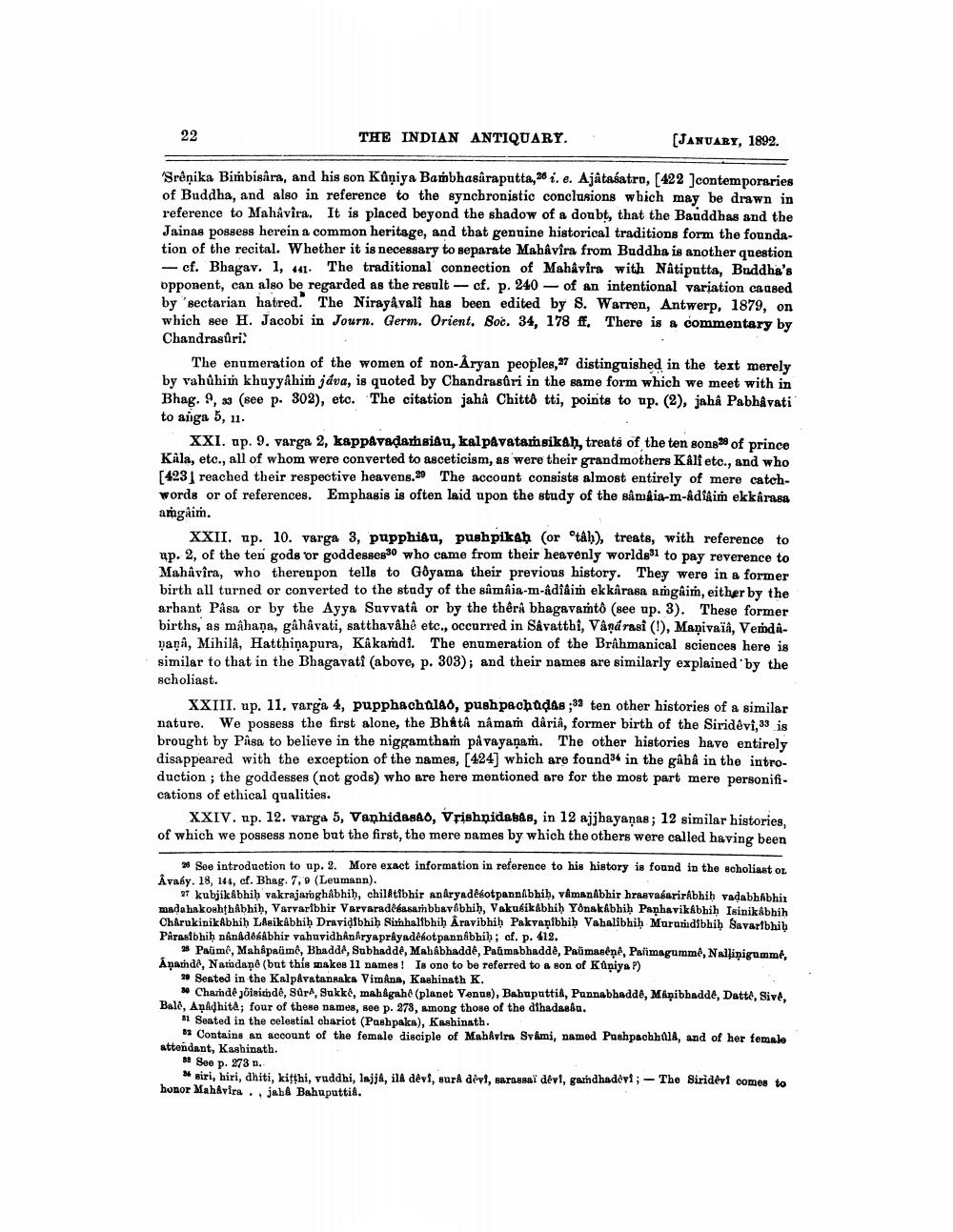________________
22
THE INDIAN ANTIQUARY.
(JANUARY, 1892.
Srêņika Bimbisara, and his son Kūņiya Bambhasäraputta, 26 1. e. Ajatasatro, [422 ]contemporaries of Buddha, and also in reference to the synchronistic conclusions which may be drawn in reference to Mahavira. It is placed beyond the shadow of a doubt, that the Bauddhas and the Jainas possess herein a common heritage, and that genuine historical traditions form the foundation of the recital. Whether it is necessary to separate Mahêvira from Buddha is another question
- cf. Bhagav. 1, "a. The traditional connection of Mahavira with Natiputta, Buddha's opponent, can also be regarded as the result - cf. p. 240 - of an intentional variation caused by'sectarian hatred. The Nirayávali has been edited by S. Warren, Antwerp, 1879, on which see H. Jacobi in Journ. Germ. Orient. Soc. 34, 178 ff. There is a commentary by Chandrasuri
The enumeration of the women of non-Aryan peoples, 27 distinguished in the text merely by vahủhin khuyyâhim java, is quoted by Chandrasûri in the same form which we meet with in Bhag. 9, s (see p. 302), etc. The citation jahâ Chittð tti, points to up. (2), jahâ Pabhavati to aiiga 5, 11.
XXI. ap. 9. varga 2, kappAvadamsiau, kalpavatamsikah, treats of the ten song of prince Kala, etc., all of whom were converted to asceticism, as 'were their grandmothers Kali etc., and who 5423 reached their respective heavens.29 The account consists almost entirely of mere catchwords or of references. Emphasis is often laid upon the study of the sâmkia-m-adikim ekkârasa amgåim.
XXII. up. 10. varga 3, pupphiau, pushpikah (or oth), treats, with reference to up. 2, of the teri gods or goddesses30 who came from their heavenly world891 to pay reverence to Mahâvîra, who therenpon tells to Gôyama their previous history. They were in a former birth all turned or converted to the study of the sâmkia-m-adikim ekkârasa amgain, either by the arhant Påsa or by the Ayya Suvvatâ or by the thêra bhagavató (see up. 3). These former births, as mahana, gahavati, satthavâhâ etc., occurred in Savatthi, Vändrasi (!), Manivača, Vendayaņa, Mihilâ, Hatthiņapura, Kakandi. The enumeration of the Brahmanical sciences here is similar to that in the Bhagavati (above, p. 303); and their names are similarly explained by the scholiast.
XXIII. up. 11, varga 4, pupphachalad, pushpachadas;" ten other histories of a similar nature. We possess the first alone, the Bhata naman dariâ, former birth of the Siridevi, 33 is brought by Pisa to believe in the niggamtham på vayanam. The other histories have entirely disappeared with the exception of the names, [424] which are found in the gabâ in the introduction; the goddesses (not gods) who are here mentioned are for the most part mere personifications of ethical qualities.
XXIV. up. 12. varga 5, Vanhidasko, Vrishạidabas, in 12 ajjhayaņas; 12 similar histories, of which we possess none but the first, the mere dames by which the others were called having been
» See introduction to up. 2. More exact information in reference to his history is found in the scholiast or Åvaby. 18, 144, cf. Bhag. 7, 9 (Leumann).
27 kubjik Abhib vakrajaroghAbhih, chilatibhir anaryadékotpannibhib, vamanAbhir hrasvabarirAbhih vadabhabhi madahakoshthAbhih, Varvaribhir Varvarad busarbbavabhih, Vakukikabhih Yonakabhih PaphavikAbhib Isinikábhih Charukinik Abhih Lasikabhih Dravidibhih Rixhhaltbhih Aravibhih Pakvapibhib Vahalibhih Murundibhib Bavarlbhib Parasibhih nånadosAbhir vahuvidhiniryapriyadehotpannibhih; cf. p. 412.
3 Paüme, Mahapaüme, Bhadde, Subhadde, Mahabhadde, Paumabhadde, Paumasené, Parimagummi, Nallipigomme, Anande, Naradan (but this makes 11 names! Is one to be referred to a son of Kuniya )
* Seated in the Kalpåvatangaka Vimina, Kashinath K.
* Chaždé jõisinde, SûrA, Sukke, mahagahe (planet Venos), Bahuputtia, Pannabhadde, Mapibhadde, Datte, Sive, Bale, Anadhita; four of these names, see p. 273, among those of the afhadaagu.
#1 Seated in the celestial chariot (Pushpaka), Kashinath.
52 Contains an account of the female disciple of Mahavira Svami, named Pashpachhala, and of her female attendant, Kashinath.
* See p. 273 n.
* siri, hiri, dhiti, kitthi, vuddhi, lajja, il devi, sur& devi, sarussal devl, gardhadevi; - The Siridevi comes to honor Mah&vira .. jab Bahuputti.




